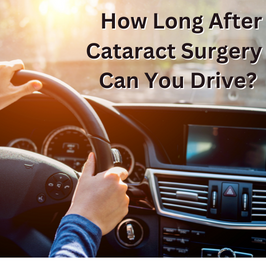How Soon After Cataract Surgery Can You Drive?

Does Driving After Cataract Surgery Affect Your Vision?
Most people can start to drive again within a day or two after cataract surgery. However, it is important to check with your eye doctor to make sure it is safe. There are a few things that can affect your ability to drive after cataract surgery, including:
– The type of eye procedure you had
– The type of anesthesia you had
– How your eye/eyes are healing
If you had cataract surgery with local anesthesia, you should be able to drive as soon as the anesthesia wears off. If you had cataract surgery with general anesthesia, it is important to wait until you are no longer feeling dizzy or sleepy before you drive.
After surgery, it is also important to make sure your eyes are healing properly. You should be able to see clearly and have good vision in both eyes before driving. If you have any questions or concerns about your eyes or vision, be sure to talk to your eye doctor.
It is also important to wait until your eyes have healed enough so that you can see well. This usually takes a few days, but it can take up to a few weeks. After surgery, your eye doctor will let you know when it is safe for you to start driving again.
In some cases, certain advanced technology iols (intraocular lenses) used during laser cataract surgery can improve your vision enough so that you no longer need to wear eye glasses or contact lenses. Depending on the lens chosen, your surgeon will discuss your customized lens outcomes. Each lens is different and uniquely chosen for your eye. However, it is important to wait until your eye doctor says your vision is okay and it is safe for you to stop wearing them before driving.
How Long After Cataract Surgery Can You Drive at Night?
Although cataract surgery is a relatively simple and safe procedure, it is important to follow your eye surgeon’s instructions for post-operative (after surgery) vision care and recovery. This includes when you can resume driving. In most cases, patients are able to start driving again after a few days, but it is best to avoid driving at night until your vision has fully recovered. You want to make sure your vision is as best as you can before operating a vehicle. This will help ensure your safety and the safety of others on the road.
Some things you can do to make sure you are safe when driving at night after cataract surgery include:
– Have someone else with you who can drive if needed
– Drive in well-lit areas
– Avoid driving on unfamiliar roads
– Take breaks often to rest your eyes
It is important to follow your surgeon’s instructions when it comes to driving after cataract surgery. In most cases, you will be able to drive after your post-operative care is complete and you have been given the green light by your vision doctor.
Is Driving Okay With Cataract Surgery Being Done Only in One Eye?
Cataract surgery is a relatively quick and simple surgical procedure that can help improve your vision and quality of life. You may be wondering if you can drive with one eye that has a cataract, when your other eye has good vision. The answer is typically yes, but it is best to check with your surgical provider beforehand and follow their specific instructions. In general, it is safe to drive as long as you have good vision in one eye and can see well enough to react to traffic and other obstacles. If your vision is significantly impaired, you may want to consider using public transportation or arranging for a ride from a friend or family member until you are able to get cataract surgery. Cataracts usually form in both eyes (clouding of your eye’s natural lens), so you may need to have surgery on both eyes to improve your vision.
If you have questions about your vision and cataract eye surgery, please call our team at (210) 585-2020 or submit your information through here!
Be sure to talk to one of our doctors about not only the benefits of vision correction, but also any risks of vision correction that may pertain to your individual needs and circumstances.

